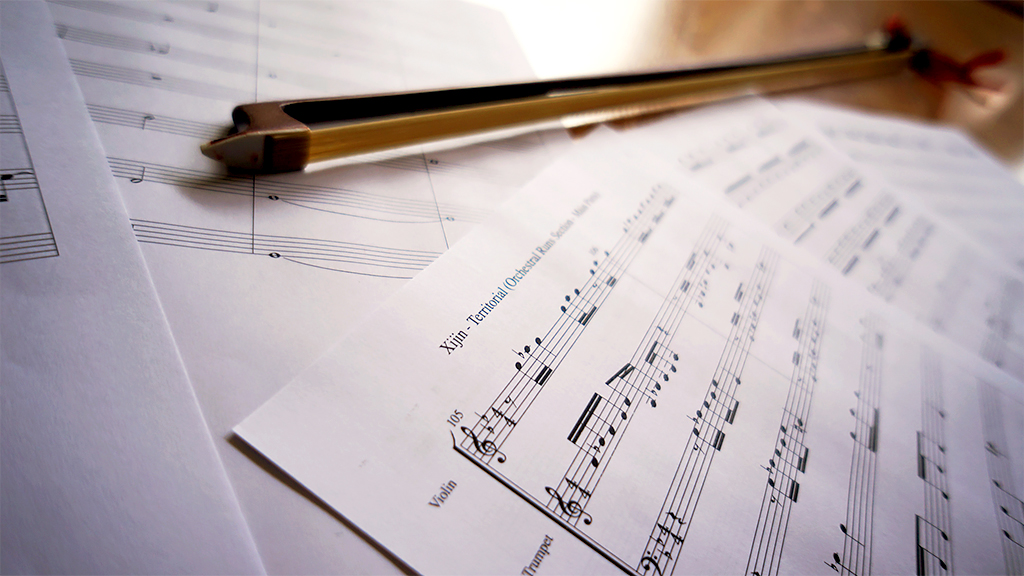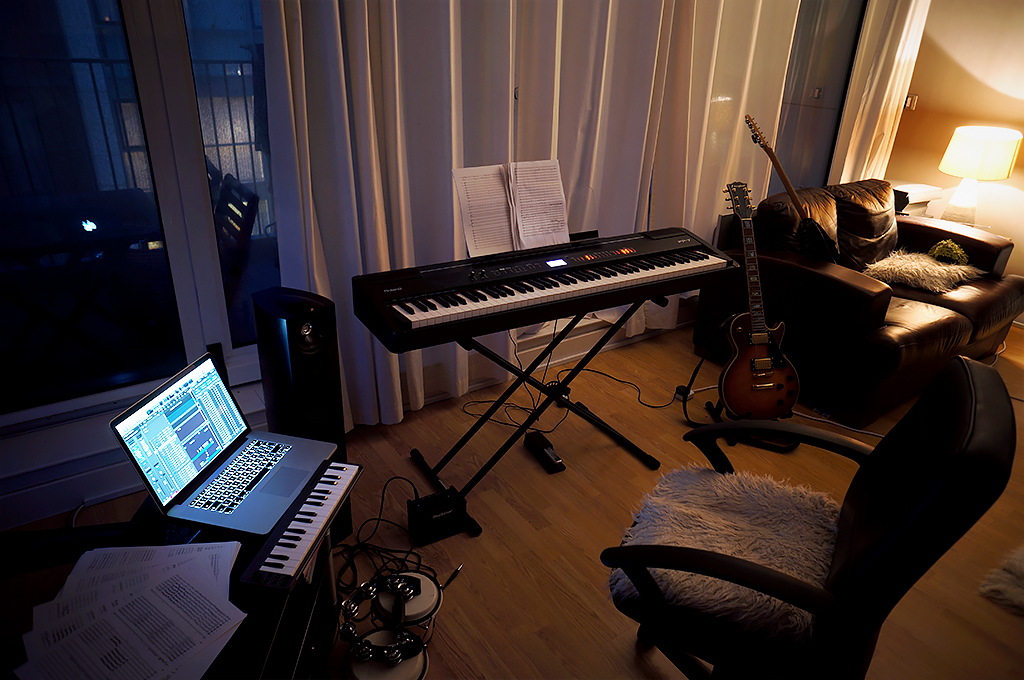In stressing quality over quantity and those who emphasize both, we sat down with Xijin Chan, one of Slashthree's newest artists to discuss his contributions to 'Monster.'
Husam Elfaki
Xijin – a massive congratulations to you on earning our featured artist accolade – It's probably the first time we've featured an artist on their debut to the collective, but at the same time you're also the first featured composer on the site. We brought you into the collective a couple of months ago. Tell us a little about what brought you here.
Xijin Chan
First thing’s first, thank you for having me and for the feature too. The pleasure is really mine.
As coincidence would have it, I’ve been working on pieces with the theme of “Monster” firmly in mind for over a year now and happen to know a Slashthree core member. When I found out about this exhibition’s theme was going to be “Monster” I jumped at the chance and the rest is history.
Husam Elfaki
I’d like to know a little bit more about you in terms of where you come from, the culture you grew up with, and the interests and inspirations that led you to what you do today. Do you find those things have had a massive influence on your creative work, or does it come from elsewhere?
Xijin Chan
I’m British born Chinese and I think one great thing about growing up walking between cultures is that you learn to enjoy and embrace things that are seemingly entirely different. You don’t feel a need to stick to any one convention – you celebrate the different, itself.
The big plus I’ve since found is that afterwards on inspection, you join the dots and only then realise there’s so many similarities in amidst the disparity. And I think it’s that perspective that can really give rise to creativity whatever your discipline or whatever style you’re chasing - but particularly so if you’re working cross-genre. Not to mention you get to enjoy so many different things in general.
Husam Elfaki
You’ve certainly came into the collective with an immediate impact; not only are your submissions some of the most distinctive of anything we’ve ever heard before, but they complimented our Monster exhibition perfectly. I wonder what it is that has influenced your creative trajectory over the years that you’ve been composing?
Xijin Chan
My musical path and influences have been pretty diverse & unconventional – my background is classical piano, I’ve played locally in a district jazz big band and along the way picked up drums and stringed instruments.
Regarding the orchestral side of things, I grew up with the likes of John Williams and Nobuo Uematsu’s soundtracks. My love of orchestral and cinematic music pretty much grew first from movies and games – incidentally, it was that period where you started to see the same composers cross between the two, and I recall discovering the likes of Giachinno for example from Medal of Honor first. Outside of classical piano, it was only after that I started taking my attention to what people often call “classical”. I remember seeing Verdi’s requiem live in London, and just thinking it just so awesome and apocalyptic that the building might have collapsed.

I got into the dark world of electronica after I discovered Noisia, Spor and co. quite a few years back and this amazing new world opened up to me of synthesisers and sound design. I heard tracks like “The Tide” and the Stompbox remix and suddenly discovered “whoa, these synths… it no longer sounded electronic even, it sounded alive”. Finding Jojo Mayer and KJ Sawka pretty much solidified my interest in Drum & Bass and it was after I discovered Chasing Shadows that I realised this was a new era: it was like heavy metal’s electronic cousins had been born. It was a new form of “heavy”. I put 1 and 1 together with the cinematic side of things and the rest is a long, often frustrating, but ultimately fun road in figuring everything out!
Husam Elfaki
One of my favourite tracks from yours in the exhibition is ‘Territorial’, which is what you would describe as cinematic dubstep. What impresses me is that you managed to turn a largely synthetic production into one of the most conceptually rich and assertive compositions I’ve heard in a long time. Tell me about the creative process and the work it involved in realising it.
Xijin Chan
Thanks – it was split amongst composing, sound design, live recording and then the whole mixing/mastering process. The orchestral elements I wrote like I usually do at the piano – sometimes the parts I have to piece together and find what sounds good, but to be honest, it nicely just came to me mostly. So it was already in my head and I just had to transcribe it as it were.
When I introduced the monster synths, I was going for a scene reminiscent of an alien ‘Avatar’ world and I wanted it complete with alien pterodactyls calling in amongst the monster growls/roars. I actually ended up listening to the Jurassic Park raptors a lot and ended up trying to synthesize something similar to that for the calls!
I love collaborating with other artists and I had a friend do vocals, and another for bass guitar/additional vocals – we’re actually at opposite ends of the country so we ended up working on it together either by phone or online. The end result was epic and we’ll definitely be doing more in the future.
Husam Elfaki
The unique convergence of cinematic orchestra and electronic music I find in your production is incredibly fascinating – Often whenever most musicians mix various genres it’s a real challenge to make it all seamless, but for you it seems effortless. How did the harmony between the two come about for you?
Xijin Chan
For my tracks up until now, a goal I’ve always set myself is that the orchestral and the electronic parts should stand up by themselves in their respective genres – that you could remove them from one another and it would still work. That way when combined, hopefully the impact is exponentially greater. I feel to do that I’ve really tried to analyse and understand each element, the theory behind everything from the music theory to the sound synthesis as much as I can, which is perhaps where some artists fall short of their own aspirations – one genre becomes overlooked and perhaps that’s where the compromise is.
So for example, whilst I’m no Bach (who I’m convinced was not human), I’ll try to write interesting counterpoint for the orchestral parts even when they are largely masked by some mad synth and/or percussion. The drummer in me wants the percussion section to be interesting in of itself as well, and I think it’s those details that build up to hopefully create something that’s greater than the sum of its parts.
Husam Elfaki
What I always find interesting is how people interpret our exhibition themes; some love to illustrate personal visions, some share their point of view on significant events, but you seem to take well to storytelling. What’s your preference in how you like to work?
Xijin Chan
For me music has always been about emotion. And that’s everything from the intense high-octane adrenaline of metal, to the sweeping emotion in soaring strings. So to get a sense of what emotion I’m trying to convey, I find the best way is to imagine the scenes and the story that the music is trying to capture, like it was a film.
In my “War Symphony” piece for example which you’ll find on my Soundcloud, I wrote out a brief description of the scenes (complete with storytelling clichés) and so the music ended up shaping up almost like I was writing cues. I had markers even in the project for where the “war” actually began, where the retreat came in, the point where the protagonist is nearing defeat, the death of the mentor/ally/lover etc.
So I mostly like to conjure up scenes in my head. Although sometimes I just mash keys and buttons until it sounds good!
Husam Elfaki
Some of the work you create normally takes advantage of unconventional samples and unorthodox methods when the situation calls for it. Out of interest, what are your go-to arsenal of tools?
Xijin Chan
I’ve mostly been using synthesis for the tracks up until now, which I’m still continually amazed by – the idea that with modern technology you could theoretically recreate any sound or any sentence that has ever existed, or which has never existed.
I use everything and anything I can get my hands on, although my go-to synths are Massive and FM8, and I’m a logic pro junkie. Actually, if I had to name what the most important tool I have is, it’d just be your standard EQ. Sometimes, the monster sound comes mostly from just the use of EQs.

Husam Elfaki
I realise that you’ve only been a part of Slashthree for a short period of time, but usually when people join us they cite an increase in confidence in their work and faster improvement. Has there been anything immediately noticeable to you about being part of a creative collective as a composer?
Xijin Chan
Absolutely, aside from collaborators this was pretty much the first that these pieces have seen in terms of exposure to anyone else, so it was really gratifying getting the great feedback that I’ve had.
I think having a critical audience like this is perfect as it in many ways is reminiscent of making music for a client – trying to judge what works in accordance with the group has been really rewarding, and the feedback you get you can use to improve your own work.
The other side of it is just the sheer amount of quality art as inspiration – writer’s block is far further away when you can draw on other people’s work on the same theme. It creates a feedback loop and hopefully everyone comes out creating art they otherwise might not have been inspired to.
Husam Elfaki
Incredible. Once again a big thanks for your contributions to the collective thus far and congratulations again – Is there anything else you’d like to say?
Xijin Chan
You can check out my music at:
https://www.youtube.com/user/xijinmusic
https://soundcloud.com/xijin
https://xijin.bandcamp.com/
Thanks for your time.